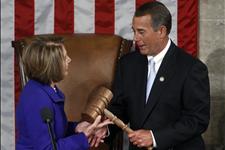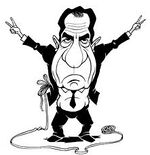First-past-the-post voting
First-past-the-post voting is an election in which the winner is the candidate who receives more votes than any others.
The outrageous notion that the highest vote-getter should be the winner has given us elected office-holders such as Adolf Hitler and Jimmy Carter; also the Oscar® for The English Patient and the Nobel Peace Prize of Barack Obama.
These results explain the international academic frenzy (a veritable poll dance) to devise voting systems in which someone less popular will be the winner.
Overview

First-past-the-post (abbreviated FPTP or FPP), is a plurality voting system. Like most successful schemes, it is applied to many cases it does not fit, such as trying to fill a number of seats at the same time.
Al Capone first defined the winner of an election as "the guy what gets the most votes." However, this simple statement is now problematic given the many candidates what do not get the most votes, the large number of campaign lawyers they employ, and the gullibility of the people to charges of unfairness and racism.
In 2000, non-winner Al Gore sued, demanding a recount in five Florida counties of his choosing. His mantra was, "Count Every Vote." The drive to get everyone into the voting booth became a drive to get everyone on the ballot, as both requirements were relaxed. But "the guy what gets the most votes" still won, now with only 10% of the vote. The majority hated all its politicians and demanded new solutions. Elections, like health care, yielded to the American tenet that anything that works will work better with 6,000 pages of regulations.
Separately, Britons took time out from inventing awful things to eat at 3 p.m. in order to whinge that there must be a better way to decide elections than to just give the seat to the person with the most votes. The Electoral Reform Society advocates abolishing FPP, arguing it is "bad for voters and bad for government." It is the oldest of the many societies that gather to gripe that their man lost an election. Their opponents are canvassing right now in order to win the next one as well.
Mechanics
Editors at Wikipedia compiled a real-life example of a years-old election in Singapore where the winner got 35% of the vote and the loser got 34%. They use this to argue that there is something wrong with the system. (These same editors had sons in the Little League and used to blame the umpiring when a game was ended by the Mercy Rule.) They offer a large number of alternatives to console losers of elections. Many such losers are gadflies trying to ban dog racing. There are many gadflies across the nation but they never elect anyone to office. Clearly, they need their own voting system.

The chief criticism of FPP is that it forces voters to pick the "lesser of two evils." For example, the U.S. Republican Party has, since Nixon, completely stopped arguing that it will do good things, but merely claims that it will wreck the country a bit more gradually than the Democratic Party, and manage the wreckage in a more businesslike way. The Tea Party movement has an aspiring agenda (not yet set down anywhere in print), but no clue on how to win elections or even communicate with voters. Surely these people need something.
A related criticism is that FPP forces voters to decide who is the best man not to govern but to thwart the leading candidate. Most Republicans spent 2015 in anguished negotiations to see who could best prevent the party from careening toward doom by nominating yet another Bush in 2016.
They argue that the entire electorate has been "dumbed down" despite a century of free public education. The average voter knows exactly when Paris Hilton last left Monitored Home Confinement but can cite none of the recent case law concerning estoppel. Clearly, the system needs to change to reflect these changing conditions.
They also argue that the media have too much power under FPP. Television networks portray certain candidates as "front-runners," and the voter either believes them, or believes that the Paris Hilton crowd believes them. Happily, under the alternative of runoff elections, the media will have no such power. And given that it will then take two years to complete an election, the media will not even be able to sell more advertisements.
Duverger's Law states that countries that use FPP will eventually become two-party systems, though it does not explain why both parties will become so awful. Economist Jeffrey Sachs wrote that "The main reason for America's majoritarian character is that Congressmen are elected using FPP. The losers win no representation at all — They are trampled in the process." Although Sachs was unaware that the same thing happens to people who vote for the winner, clearly no one should ever be trampled. Thus, the search is on for a system that will deliver the goods to small political parties with a message everyone wants to hear, but never enough to consider voting for them.
Wasted votes
The principal concept used by opponents of FPP is the "wasted vote." This expands the set of voters who did not get what they wanted, to include some voters who did get what they wanted but could have spent the day slipping dollars under the garters of nude dancers rather than stuck in line at the firehouse. (Dance fans, including the Bill Clinton/Robert Menendez wing of the Democratic Party, mistakenly refer to FPP as "First Past the Pole.")
For example, the landslide re-election of Ronald Reagan in 1984 was in fact an epidemic of wasted votes:
- Everyone who voted for Walter Mondale was a wasted vote, because Mondale did not become President. Mondale told the nation that Reagan had a secret plan to raise taxes (which remained secret throughout Reagan's Presidency), and Mondale was a better man because his plan was out-of-the-closet. It is more charitable to tell Mondale voters their votes were "wasted" than "cast foolishly," especially as the latter would not change even under election reform.
- Everyone who voted for one of the minor parties was a wasted vote too. Unlike Mondale voters, they at least knew that going in, like any Democrat in Texas.
- As Reagan won every state except Minnesota, many Reagan voters wasted their vote, as he could have squeaked by without them. For example, Reagan voters in New Hampshire are "wasted votes," because nobody cares, not even when they schedule primaries during snowstorms the previous winter.
- Reagan galloped to victory in most of the states that he won. Thus, many Reagan voters even in consequential states wasted their votes, because Reagan didn't need them, except for something that Democrats call "bragging rights" when they win and govern without getting Congress to pass a law.
- Every vote in Hawaii and Alaska is wasted, as the election is decided in the East before those voters even wake up. (Likewise Californians, who wake up late.)
As huge as the national consensus for Reagan was, there is a huger consensus that it was a sheer waste of time going to the polls. Voters whose trip to the polls was pointless are a supermajority, obviously clamoring for reform. This consensus knows that modern elections, like modern wikis, are not about a quality product but two competing goals:
- That I will prevail, and
- That everyone will pay attention to me.
Treachery
Advocates (especially now that they are an Organization) list many other acts of treachery that occur under FPP, and presumably would never keep occurring after they are given the last word in election law. This skullduggery includes:
- The leading candidate inducing, paying, or blackmailing fringe candidates to withdraw their candidacies. This offense denies voters their right to continue to claim victimhood as "wasted votes."
- Conversely, the tendency for not-quite-leading candidates to induce "spoiler" candidates to declare for the sole purpose of sucking votes away from the leader, which keeps the leader from winning and then sucking.
- In Gerrymandering, entire districts are redrawn to ensure the wasting of every vote that is not for a given individual or party. Such self-serving abuse of the political process would be gone for good if we could simply ensure that the highest vote-getter does not win the election.
Advocates do not address the tendency of a leading candidate to argue that splinter candidates who oppose his program (1) hate the supposed beneficiary, (2) are rooting for the worst possible result for everyone, (3) have received payments from the Koch Brothers, or (4) are sockpuppets of a global businessmen's cabal. However, these abuses would certainly also be a thing of the past if we simply ditched FPP. In fact, under an enlightened voting system, the British Prime Minister would probably even stop scheduling the dates of elections merely to jockey for more personal power.
Criteria
Before putting their necks on the chopping block with an actual proposal (which might prove even worse than FPP), scholars first aired a series of criteria that a new voting system would have to satisfy. These included the following:
- Majority criterion
The majority criterion states that, "If a candidate is preferred by more than 50%, then he is the winner." Apart from noting that there is nothing wrong with FPP under this criterion, it is hard to know that a candidate is preferred by more than 50% without conducting the FPP vote in the first place. However, scholars hold out some measurements that could be used as proxies to gauge majority support, such as belonging to registered education Guilds.
- Condorcet winner criterion

The Condorcet winner criterion tasks us to throw the winner under FPP into a one-on-one contest against every other candidate. This proposal has no precedent; even when the Romans pitted Christians against lions, they did not go on to find out who was the top lion. Under the Condorcet rule, a winner could not take office until thoroughly exhausted.
- Condorcet loser criterion
This criterion does not demand that the winner win head-to-head against everyone else, but only that he not lose head-to-head against anyone else. It is just as time-consuming as the Condorcet winner (and Condorcet's many other criteria, such as Condorcet chimney-sweep and Condorcet spray-paint vandal). In fact, except for the case of ties, it is identical to the Condorcet winner, prompting confusion as to what diverted Condorcet from his better-known research on the number of angels that can pole-dance on the head of a pin.
However, the Condorcet loser has innate appeal, as everyone knows that there is someone, way down on the ballot, who could have knocked off that smug politician who did nothing in his entire worthless life but get the most votes.
- Independence of irrelevant alternatives criterion
Titles of scholarly criteria are much like titles of instrumental jazz songs, in that the longer the title, the more ridiculous the product. This little ditty states that a candidate must not be the winner unless he would still win if Ronald Reagan rose from the dead, got his mind back, and again set out to reduce tax rates from 70% to 28%, never mind that they are no longer 70% to begin with. Despite being ridiculous, this criterion has the benefit of being impossible to measure, which is always an advantage in politics.
- Independence of clones criterion
This criterion is nearly as ridiculous as the preceding one, according to the length-of-the-name-of-the-criterion criterion discussed in the preceding one. It states that the winner only wins if a hypothetical clone, who has identical positions on the issues and is indistinguishable to the voter, would have won the election as well. The benefit of this criterion is exactly the same as the benefit of the preceding one.
Alternatives

Alternatives to FPP consist of conducting an election that strongly smells like FPP, then having everyone sit around and ask, "What next?" This again stems from the 2000 U.S. election, in which Al Gore, having graciously conceded to George W. Bush but still anxious to keep him from actually achieving anything, noticed there were still millions in the campaign coffers, which might fund a lawsuit or two.
Thus, the usual first step after an election is held and one candidate unambiguously gets the most votes, is to rack up the balls (pictured) for yet another election. In the second election, voters who picked the wrong guy will be pandered to by being allowed to vote again. Their candidate will be stricken from the ballot (though this is obviously not what they voted for) and they can vote for or against the winner.
This process is repeated until there are only two candidates left, and the term of the legislature we were trying to elect is half over.
- American precedents
U.S. states such as Louisiana conduct "runoff" elections featuring only the top two candidates in the general election. Louisiana, with notoriously low elevation on the Mississippi River bayou, is especially concerned about runoff in all its forms. Blanking a runoff ballot is a capital offense so politicians can always claim they won an absolute majority in some election somewhere. There is never any problem telling the rest of the nation to wait to find out which party really controls the U.S. Senate, and the process results in the nation's most responsible governance, whose name is always Landrieu. Louisiana's runoff voting is the only case in which Britons have ever cited the Southern United States as a positive model.
- The winner's role
As noted above, some of the winner's margin likewise consisted of "wasted votes." An enlightened election reform will let the landslide winner redeploy some of his voters, just as the losing candidates will be able to. An example of roles they might be given in the runoff is that of Larry Flynt, offering to pay for evidence of a sex scandal on the candidates.
- Longer ballots
Scholars who prefer not to stretch a single election over two growing seasons say the same effect can be achieved by complicating the ballot rather than complicating the calendar. In these jurisdictions, moonbat voters are asked, assuming that the buck-toothed Communist loses, which of the two real candidates he would prefer. This achieves the desired effect of letting young voters hold their breaths until they turn blue and then go on to cast real votes.
Complicated ballots could address the winner's wasted votes as well. In some Australian states, the ballot asks the voter:
| “ | In the case that your candidate should win so overwhelmingly that your vote was not really needed, which other candidate would you most like to give a bloody nose? | ” |
Party-list voting
Some nations (even ones important enough to have cell phones, such as Israel, Mexico, and the Netherlands) use party-list voting. Instead of specifying on the ballot which candidate one wants to win, the voter specifies on the ballot which ideology one wants to win. In this way, all those opponents of dog racing can join with opponents across the nation, and perhaps elect one guy to cast one vote in the legislature to ban dog racing.
More likely, they will elect 0.8 guy. No system deals with this by amputating a legislator's fingers, arms, and legs until the numbers work out right. Instead, a nation picks one of several popular apportionment paradoxes to make sense of the problem. Balinsky and Young, two professors of mathematics who were never elected to anything higher than the planning committee for the faculty summer picnic, proved in 1982 that there is no way to deal out the seats in a new legislature that is not utter nonsense. Sometimes winning more votes results in electing fewer reps, and sometimes enlarging the legislature gives some states fewer seats. There is also the notorious Alabama paradox. However, mercifully, additional Alabamas have not begun popping up around the world.
Voters using party-list voting do not vote for anyone they know, despite his stand on abortion, disturbing body odor, or tendency to be surrounded by handlers who never give straight answers. Instead, they vote for their favorite color or a picture of a flower. They are represented by someone from the other coast whom they will never meet. However, they have the satisfaction of knowing that their point-of-view is being exactly expressed — especially if they never, ever read the newspaper.
Against the claim that first-past-the-post voting gives the national congress to a party with vague beliefs, party-list voting fills it with very specific parties, which form a "coalition government" that provides the vital policy vagueness. Fringe voters are able to exactly specify "what I am like" without changing the final result.
Summary
Continuing scholarly work on election reform will make it much more nuanced than the primitive system, where one can win an election merely by getting the most votes — something anyone can do, although the author's party never does. New systems will clear the way for voters who want to emit a primal scream but then rejoin the process under an air of respectability. Finally, it will garner additional funding for continuing scholarly work on election reform.
See also
| Featured version: 7 August 2015 | |
| This article has been featured on the main page. — You can vote for or nominate your favourite articles at Uncyclopedia:VFH. | |





